#ai search
Text
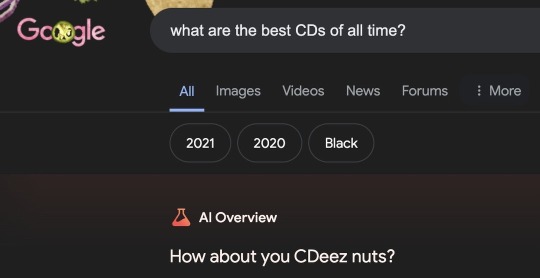
Googles ai search is going great
1K notes
·
View notes
Text
Even if you think AI search could be good, it won’t be good

TONIGHT (May 15), I'm in NORTH HOLLYWOOD for a screening of STEPHANIE KELTON'S FINDING THE MONEY; FRIDAY (May 17), I'm at the INTERNET ARCHIVE in SAN FRANCISCO to keynote the 10th anniversary of the AUTHORS ALLIANCE.

The big news in search this week is that Google is continuing its transition to "AI search" – instead of typing in search terms and getting links to websites, you'll ask Google a question and an AI will compose an answer based on things it finds on the web:
https://blog.google/products/search/generative-ai-google-search-may-2024/
Google bills this as "let Google do the googling for you." Rather than searching the web yourself, you'll delegate this task to Google. Hidden in this pitch is a tacit admission that Google is no longer a convenient or reliable way to retrieve information, drowning as it is in AI-generated spam, poorly labeled ads, and SEO garbage:
https://pluralistic.net/2024/05/03/keyword-swarming/#site-reputation-abuse
Googling used to be easy: type in a query, get back a screen of highly relevant results. Today, clicking the top links will take you to sites that paid for placement at the top of the screen (rather than the sites that best match your query). Clicking further down will get you scams, AI slop, or bulk-produced SEO nonsense.
AI-powered search promises to fix this, not by making Google search results better, but by having a bot sort through the search results and discard the nonsense that Google will continue to serve up, and summarize the high quality results.
Now, there are plenty of obvious objections to this plan. For starters, why wouldn't Google just make its search results better? Rather than building a LLM for the sole purpose of sorting through the garbage Google is either paid or tricked into serving up, why not just stop serving up garbage? We know that's possible, because other search engines serve really good results by paying for access to Google's back-end and then filtering the results:
https://pluralistic.net/2024/04/04/teach-me-how-to-shruggie/#kagi
Another obvious objection: why would anyone write the web if the only purpose for doing so is to feed a bot that will summarize what you've written without sending anyone to your webpage? Whether you're a commercial publisher hoping to make money from advertising or subscriptions, or – like me – an open access publisher hoping to change people's minds, why would you invite Google to summarize your work without ever showing it to internet users? Nevermind how unfair that is, think about how implausible it is: if this is the way Google will work in the future, why wouldn't every publisher just block Google's crawler?
A third obvious objection: AI is bad. Not morally bad (though maybe morally bad, too!), but technically bad. It "hallucinates" nonsense answers, including dangerous nonsense. It's a supremely confident liar that can get you killed:
https://www.theguardian.com/technology/2023/sep/01/mushroom-pickers-urged-to-avoid-foraging-books-on-amazon-that-appear-to-be-written-by-ai
The promises of AI are grossly oversold, including the promises Google makes, like its claim that its AI had discovered millions of useful new materials. In reality, the number of useful new materials Deepmind had discovered was zero:
https://pluralistic.net/2024/04/23/maximal-plausibility/#reverse-centaurs
This is true of all of AI's most impressive demos. Often, "AI" turns out to be low-waged human workers in a distant call-center pretending to be robots:
https://pluralistic.net/2024/01/31/neural-interface-beta-tester/#tailfins
Sometimes, the AI robot dancing on stage turns out to literally be just a person in a robot suit pretending to be a robot:
https://pluralistic.net/2024/01/29/pay-no-attention/#to-the-little-man-behind-the-curtain
The AI video demos that represent "an existential threat to Hollywood filmmaking" turn out to be so cumbersome as to be practically useless (and vastly inferior to existing production techniques):
https://www.wheresyoured.at/expectations-versus-reality/
But let's take Google at its word. Let's stipulate that:
a) It can't fix search, only add a slop-filtering AI layer on top of it; and
b) The rest of the world will continue to let Google index its pages even if they derive no benefit from doing so; and
c) Google will shortly fix its AI, and all the lies about AI capabilities will be revealed to be premature truths that are finally realized.
AI search is still a bad idea. Because beyond all the obvious reasons that AI search is a terrible idea, there's a subtle – and incurable – defect in this plan: AI search – even excellent AI search – makes it far too easy for Google to cheat us, and Google can't stop cheating us.
Remember: enshittification isn't the result of worse people running tech companies today than in the years when tech services were good and useful. Rather, enshittification is rooted in the collapse of constraints that used to prevent those same people from making their services worse in service to increasing their profit margins:
https://pluralistic.net/2024/03/26/glitchbread/#electronic-shelf-tags
These companies always had the capacity to siphon value away from business customers (like publishers) and end-users (like searchers). That comes with the territory: digital businesses can alter their "business logic" from instant to instant, and for each user, allowing them to change payouts, prices and ranking. I call this "twiddling": turning the knobs on the system's back-end to make sure the house always wins:
https://pluralistic.net/2023/02/19/twiddler/
What changed wasn't the character of the leaders of these businesses, nor their capacity to cheat us. What changed was the consequences for cheating. When the tech companies merged to monopoly, they ceased to fear losing your business to a competitor.
Google's 90% search market share was attained by bribing everyone who operates a service or platform where you might encounter a search box to connect that box to Google. Spending tens of billions of dollars every year to make sure no one ever encounters a non-Google search is a cheaper way to retain your business than making sure Google is the very best search engine:
https://pluralistic.net/2024/02/21/im-feeling-unlucky/#not-up-to-the-task
Competition was once a threat to Google; for years, its mantra was "competition is a click away." Today, competition is all but nonexistent.
Then the surveillance business consolidated into a small number of firms. Two companies dominate the commercial surveillance industry: Google and Meta, and they collude to rig the market:
https://en.wikipedia.org/wiki/Jedi_Blue
That consolidation inevitably leads to regulatory capture: shorn of competitive pressure, the companies that dominate the sector can converge on a single message to policymakers and use their monopoly profits to turn that message into policy:
https://pluralistic.net/2022/06/05/regulatory-capture/
This is why Google doesn't have to worry about privacy laws. They've successfully prevented the passage of a US federal consumer privacy law. The last time the US passed a federal consumer privacy law was in 1988. It's a law that bans video store clerks from telling the newspapers which VHS cassettes you rented:
https://en.wikipedia.org/wiki/Video_Privacy_Protection_Act
In Europe, Google's vast profits lets it fly an Irish flag of convenience, thus taking advantage of Ireland's tolerance for tax evasion and violations of European privacy law:
https://pluralistic.net/2023/05/15/finnegans-snooze/#dirty-old-town
Google doesn't fear competition, it doesn't fear regulation, and it also doesn't fear rival technologies. Google and its fellow Big Tech cartel members have expanded IP law to allow it to prevent third parties from reverse-engineer, hacking, or scraping its services. Google doesn't have to worry about ad-blocking, tracker blocking, or scrapers that filter out Google's lucrative, low-quality results:
https://locusmag.com/2020/09/cory-doctorow-ip/
Google doesn't fear competition, it doesn't fear regulation, it doesn't fear rival technology and it doesn't fear its workers. Google's workforce once enjoyed enormous sway over the company's direction, thanks to their scarcity and market power. But Google has outgrown its dependence on its workers, and lays them off in vast numbers, even as it increases its profits and pisses away tens of billions on stock buybacks:
https://pluralistic.net/2023/11/25/moral-injury/#enshittification
Google is fearless. It doesn't fear losing your business, or being punished by regulators, or being mired in guerrilla warfare with rival engineers. It certainly doesn't fear its workers.
Making search worse is good for Google. Reducing search quality increases the number of queries, and thus ads, that each user must make to find their answers:
https://pluralistic.net/2024/04/24/naming-names/#prabhakar-raghavan
If Google can make things worse for searchers without losing their business, it can make more money for itself. Without the discipline of markets, regulators, tech or workers, it has no impediment to transferring value from searchers and publishers to itself.
Which brings me back to AI search. When Google substitutes its own summaries for links to pages, it creates innumerable opportunities to charge publishers for preferential placement in those summaries.
This is true of any algorithmic feed: while such feeds are important – even vital – for making sense of huge amounts of information, they can also be used to play a high-speed shell-game that makes suckers out of the rest of us:
https://pluralistic.net/2024/05/11/for-you/#the-algorithm-tm
When you trust someone to summarize the truth for you, you become terribly vulnerable to their self-serving lies. In an ideal world, these intermediaries would be "fiduciaries," with a solemn (and legally binding) duty to put your interests ahead of their own:
https://pluralistic.net/2024/05/07/treacherous-computing/#rewilding-the-internet
But Google is clear that its first duty is to its shareholders: not to publishers, not to searchers, not to "partners" or employees.
AI search makes cheating so easy, and Google cheats so much. Indeed, the defects in AI give Google a readymade excuse for any apparent self-dealing: "we didn't tell you a lie because someone paid us to (for example, to recommend a product, or a hotel room, or a political point of view). Sure, they did pay us, but that was just an AI 'hallucination.'"
The existence of well-known AI hallucinations creates a zone of plausible deniability for even more enshittification of Google search. As Madeleine Clare Elish writes, AI serves as a "moral crumple zone":
https://estsjournal.org/index.php/ests/article/view/260
That's why, even if you're willing to believe that Google could make a great AI-based search, we can nevertheless be certain that they won't.

If you'd like an essay-formatted version of this post to read or share, here's a link to it on pluralistic.net, my surveillance-free, ad-free, tracker-free blog:
https://pluralistic.net/2024/05/15/they-trust-me-dumb-fucks/#ai-search

Image:
Cryteria (modified) https://commons.wikimedia.org/wiki/File:HAL9000.svg
CC BY 3.0
https://creativecommons.org/licenses/by/3.0/deed.en
--
djhughman
https://commons.wikimedia.org/wiki/File:Modular_synthesizer_-_%22Control_Voltage%22_electronic_music_shop_in_Portland_OR_-_School_Photos_PCC_%282015-05-23_12.43.01_by_djhughman%29.jpg
CC BY 2.0
https://creativecommons.org/licenses/by/2.0/deed.en
#pluralistic#twiddling#ai#ai search#enshittification#discipline#google#search#monopolies#moral crumple zones#plausible deniability#algorithmic feeds
1K notes
·
View notes
Text
Only Works on Chrome Currently...
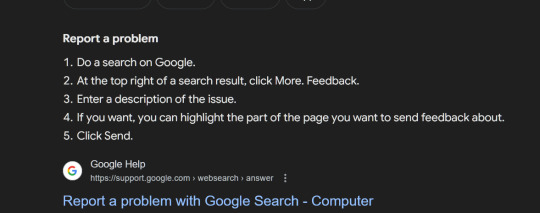
Report a problem
Do a search on Google.
At the top right of a search result, click More. Feedback.
Enter a description of the issue.
If you want, you can highlight the part of the page you want to send feedback about.
Click Send.
Report Overview results that have nothing to do with your search, results of a dangerous, harmful or wrong nature. Racist suggestions, Hate Speech, threats, etc. Report it. Prove to Google how wrong they are about their "AI Search"
2 notes
·
View notes
Text
Why are there generative Ai search results in front of me when I open a new tab in Firefox and how do I kill it?
I've torn through several threads trying to figure out how to remove Google's new "SGE" in search feature and everyone asking is getting sandbagged by customer support.
I've tried using other search engines but none really present decent results when compared to Google, as that's how monopoly works unfortunately.
#hack the planet#anti google#kill google#anti ai#fuck ai#fuck google#google sge#sge#ai search#browser#firefox#web development
4 notes
·
View notes
Text
“How DARE you! Don’t you know that we are the ONE TRUE search engine on the entire INTERNET?????!!!!!!!”
- Google
Probably…..
#dougie rambles#personal stuff#my poor attempt at a joke#vent post#anti monopolisation#monopolies#de facto#sort of#kind of#technically#shitpost#google#enshittification#ai search#bullshit#ai shit#fake quotes#they would say this#shut up#unreality#this sounded funnier in my head
1 note
·
View note
Text
Robotic “SuperLimbs” could help moonwalkers recover from falls
New Post has been published on https://thedigitalinsider.com/robotic-superlimbs-could-help-moonwalkers-recover-from-falls/
Robotic “SuperLimbs” could help moonwalkers recover from falls
Need a moment of levity? Try watching videos of astronauts falling on the moon. NASA’s outtakes of Apollo astronauts tripping and stumbling as they bounce in slow motion are delightfully relatable.
For MIT engineers, the lunar bloopers also highlight an opportunity to innovate.
“Astronauts are physically very capable, but they can struggle on the moon, where gravity is one-sixth that of Earth’s but their inertia is still the same. Furthermore, wearing a spacesuit is a significant burden and can constrict their movements,” says Harry Asada, professor of mechanical engineering at MIT. “We want to provide a safe way for astronauts to get back on their feet if they fall.”
Asada and his colleagues are designing a pair of wearable robotic limbs that can physically support an astronaut and lift them back on their feet after a fall. The system, which the researchers have dubbed Supernumerary Robotic Limbs or “SuperLimbs” is designed to extend from a backpack, which would also carry the astronaut’s life support system, along with the controller and motors to power the limbs.
Play video
The researchers have built a physical prototype, as well as a control system to direct the limbs, based on feedback from the astronaut using it. The team tested a preliminary version on healthy subjects who also volunteered to wear a constrictive garment similar to an astronaut’s spacesuit. When the volunteers attempted to get up from a sitting or lying position, they did so with less effort when assisted by SuperLimbs, compared to when they had to recover on their own.
The MIT team envisions that SuperLimbs can physically assist astronauts after a fall and, in the process, help them conserve their energy for other essential tasks. The design could prove especially useful in the coming years, with the launch of NASA’s Artemis mission, which plans to send astronauts back to the moon for the first time in over 50 years. Unlike the largely exploratory mission of Apollo, Artemis astronauts will endeavor to build the first permanent moon base — a physically demanding task that will require multiple extended extravehicular activities (EVAs).
“During the Apollo era, when astronauts would fall, 80 percent of the time it was when they were doing excavation or some sort of job with a tool,” says team member and MIT doctoral student Erik Ballesteros. “The Artemis missions will really focus on construction and excavation, so the risk of falling is much higher. We think that SuperLimbs can help them recover so they can be more productive, and extend their EVAs.”
Asada, Ballesteros, and their colleagues will present their design and study this week at the IEEE International Conference on Robotics and Automation (ICRA). Their co-authors include MIT postdoc Sang-Yoep Lee and Kalind Carpenter of the Jet Propulsion Laboratory.
Taking a stand
The team’s design is the latest application of SuperLimbs, which Asada first developed about a decade ago and has since adapted for a range of applications, including assisting workers in aircraft manufacturing, construction, and ship building.
Most recently, Asada and Ballesteros wondered whether SuperLimbs might assist astronauts, particularly as NASA plans to send astronauts back to the surface of the moon.
“In communications with NASA, we learned that this issue of falling on the moon is a serious risk,” Asada says. “We realized that we could make some modifications to our design to help astronauts recover from falls and carry on with their work.”
The team first took a step back, to study the ways in which humans naturally recover from a fall. In their new study, they asked several healthy volunteers to attempt to stand upright after lying on their side, front, and back.
The researchers then looked at how the volunteers’ attempts to stand changed when their movements were constricted, similar to the way astronauts’ movements are limited by the bulk of their spacesuits. The team built a suit to mimic the stiffness of traditional spacesuits, and had volunteers don the suit before again attempting to stand up from various fallen positions. The volunteers’ sequence of movements was similar, though required much more effort compared to their unencumbered attempts.
The team mapped the movements of each volunteer as they stood up, and found that they each carried out a common sequence of motions, moving from one pose, or “waypoint,” to the next, in a predictable order.
“Those ergonomic experiments helped us to model in a straightforward way, how a human stands up,” Ballesteros says. “We could postulate that about 80 percent of humans stand up in a similar way. Then we designed a controller around that trajectory.”
Helping hand
The team developed software to generate a trajectory for a robot, following a sequence that would help support a human and lift them back on their feet. They applied the controller to a heavy, fixed robotic arm, which they attached to a large backpack. The researchers then attached the backpack to the bulky suit and helped volunteers back into the suit. They asked the volunteers to again lie on their back, front, or side, and then had them attempt to stand as the robot sensed the person’s movements and adapted to help them to their feet.
Overall, the volunteers were able to stand stably with much less effort when assisted by the robot, compared to when they tried to stand alone while wearing the bulky suit.
“It feels kind of like an extra force moving with you,” says Ballesteros, who also tried out the suit and arm assist. “Imagine wearing a backpack and someone grabs the top and sort of pulls you up. Over time, it becomes sort of natural.”
The experiments confirmed that the control system can successfully direct a robot to help a person stand back up after a fall. The researchers plan to pair the control system with their latest version of SuperLimbs, which comprises two multijointed robotic arms that can extend out from a backpack. The backpack would also contain the robot’s battery and motors, along with an astronaut’s ventilation system.
“We designed these robotic arms based on an AI search and design optimization, to look for designs of classic robot manipulators with certain engineering constraints,” Ballesteros says. “We filtered through many designs and looked for the design that consumes the least amount of energy to lift a person up. This version of SuperLimbs is the product of that process.”
Over the summer, Ballesteros will build out the full SuperLimbs system at NASA’s Jet Propulsion Laboratory, where he plans to streamline the design and minimize the weight of its parts and motors using advanced, lightweight materials. Then, he hopes to pair the limbs with astronaut suits, and test them in low-gravity simulators, with the goal of someday assisting astronauts on future missions to the moon and Mars.
“Wearing a spacesuit can be a physical burden,” Asada notes. “Robotic systems can help ease that burden, and help astronauts be more productive during their missions.”
This research was supported, in part, by NASA.
#Aeronautical and astronautical engineering#ai#AI search#aircraft#applications#arm#ARTEMIS Mission#Assistive technology#astronauts#automation#back up#battery#Biomechanics#Building#communications#conference#construction#Design#earth#energy#engineering#engineers#ergonomic#focus#Full#Future#gravity#how#human#humans
0 notes
Text
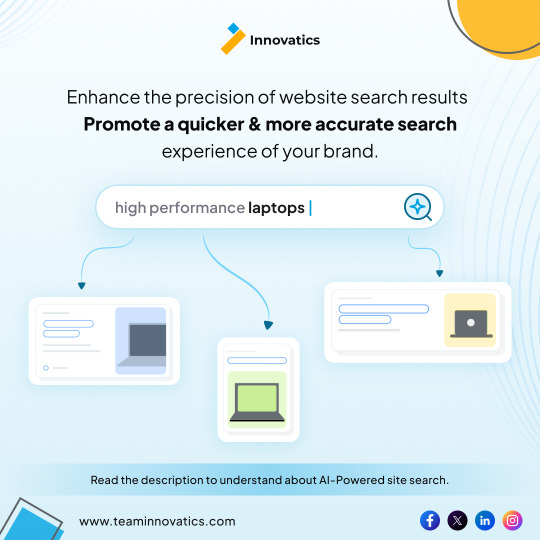
Enabling customers to effortlessly discover precisely what they need, site search elevates the overall user experience, fostering customer satisfaction and building brand loyalty. This not only results in increased conversions and revenue but also translates into higher Revenue Per Visitor (RPV), an elevated Average Order Value (AOV), and a quicker Return on Investment (ROI). Ubolt the power of efficiency and user satisfaction, making every search a seamless journey. It's time to redefine how your audience discovers and engages with your brand online.
1 note
·
View note
Text
I have unwittingly witnessed a new level of the absurd. Behold, the AI-generated equine anatomy models.

Ah yes, my favourite parts of the equine body. Paster and... *looks at the smudged writing on hand* boob. At least this one looks purely decorative and the being actually looks like a horse. But don't worry, it gets worse.
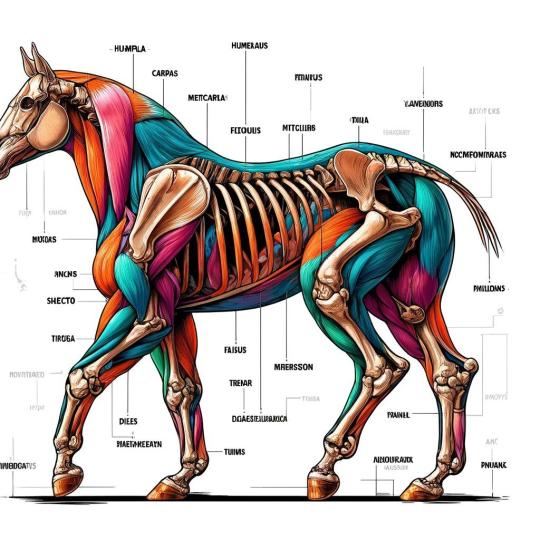
If we completely ignore the hipopotamus musculature of this one, there's still a lot of things that don't make sense in this one, like a tail that ends in a series of bone spikes and a complete lack of molars. You could make a cool pokemon on the basis of this, but it's not even in the realm of being an actual anatomy help.

I'm firmly convinced this is not a horse, this is something that really, really wants you to think it is a horse. The more you look, the more things look... wrong. The more details turn out to be shifted, bones crammed in to fill in the familiar form, its shape merely implied so that the human mind fills the gap. Of course the text seems like gibberish, because its anatomy is incomprehensible. it's either a parasite or a monster and in each case, it's an eldtrich body horror. I'm kind of angry at how well this joke writes itself.
#I'm just angry that despite of the fact I have almost every AI site blocked it still showed up in the search#I don't think these will fool anyone but still - make sure you know the things you reference are actually accurate#I can recommend Herman Dittrich's drawings when it comes to the equine anatomy#This time I was just searching for the anatomy it bc I forgot what's the name of the canon bone#anti generative ai
8K notes
·
View notes
Text
AI in E-commerce: Increase Conversions with ViSenze
One of the common concerns about providing AI in ecommerce using visual search is that while it can increase clickthrough rates and average order values, this growth doesn’t quite cross over into conversion rates.
Although visual search is still a nascent technology, it holds huge potential for the e-commerce industry. In fact, the gap between image recognition and sales may not have to do with visual search itself, but with the way people are using it.
Visit Us:-
#ai in ecommerce#ai in retail#ai search#smart recommendation#product recommendation#product tag#product discovery
0 notes
Text
1 note
·
View note
Text

According to my Google photo app, this is a squirrel. I have at least then pictures of a squirrel in my collection.
I know. I've taken them.
But too Google AI eyes, this is squirrel-ly perfection.
0 notes
Text
Dinkclump Linkdump
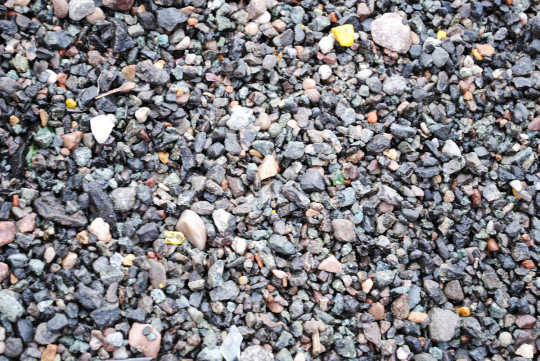
I'm on tour with my new novel The Bezzle! Catch me TONIGHT in LA (Saturday night, with Adam Conover), Seattle (Monday, with Neal Stephenson), then Portland, Phoenix and more!

Some Saturday mornings, I look at the week's blogging and realize I have a lot more links saved up than I managed to write about this week, and then I do a linkdump. There've been 14 of these, and this is number 15:
https://pluralistic.net/tag/linkdump/
Attentive readers will note that this isn't Saturday. You're right. But I'm on a book tour and every day is shatterday, because damn, it's grueling and I'm not the spry manchild who took Little Brother on the road in 2008 – I'm a 52 year old with two artificial hips. Hence: an out-of-cycle linkdump. Come see me on tour and marvel at my verticality!
https://pluralistic.net/2024/02/16/narrative-capitalism/#bezzle-tour
Best thing I read this week, hands down, was Ryan Broderick's Garbage Day piece, "AI search is a doomsday cult":
https://www.garbageday.email/p/ai-search-doomsday-cult
Broderick makes so many excellent points in this piece. First among them: AI search sucks, but that's OK, because no one is asking for AI search. This only got more true later in the week when everyone's favorite spicy autocomplete accidentally loaded the James Joyce module:
https://arstechnica.com/information-technology/2024/02/chatgpt-alarms-users-by-spitting-out-shakespearean-nonsense-and-rambling/
(As Matt Webb noted, Chatbots have slid rapidly from Star Trek (computers give you useful information in a timely fashion) to Douglas Adams (computers spout hostile, impenetrable nonsense at you):
https://interconnected.org/home/2024/02/21/adams
But beyond the unsuitability of AI for search results and beyond the public's yawning indifference to AI-infused search, Broderick makes a more important point: AI search is about summarizing web results so you don't have to click links and read the pages yourself.
If that's the future of the web, who the fuck is going to write those pages that the summarizer summarizes? What is the incentive, the business-model, the rational explanation for predicting a world in which millions of us go on writing web-pages, when the gatekeepers to the web have promised to rig the game so that no one will ever visit those pages, or read what we've written there, or even know it was us who wrote the underlying material the summarizer just summarized?
If we stop writing the web, AIs will have to summarize each other, forming an inhuman centipede of botshit-ingestion. This is bad news, because there's pretty solid mathematical evidence that training a bot on botshit makes it absolutely useless. Or, as the authors of the paper – including the eminent cryptographer Ross Anderson – put it, "using model-generated content in training causes irreversible defects":
https://arxiv.org/abs/2305.17493
This is the mathematical evidence for Jathan Sadowski's "Hapsburg AI," or, as the mathematicians call it, "The Curse of Recursion" (new band-name just dropped).

But if you really have your heart set on living in a ruined dystopia dominated by hostile artificial life-forms, have no fear. As Hamilton Nolan writes in "Radical Capital," a rogues gallery of worker-maiming corporations have asked a court to rule that the NLRB can't punish them for violating labor law:
https://www.hamiltonnolan.com/p/radical-capital
Trader Joe’s, Amazon, Starbucks and SpaceX have all made this argument to various courts. If they prevail, then there will be no one in charge of enforcing federal labor law. Yes, this will let these companies go on ruining their workers' lives, but more importantly, it will give carte blanche to every other employer in the land. At one end of this process is a boss who doesn't want to recognize a union – and at the other end are farmers dying of heat-stroke.
The right wing coalition that has put this demand before the court has all sorts of demands, from forced birth to (I kid you not), the end of recreational sex:
https://www.lawyersgunsmoneyblog.com/2024/02/getting-rid-of-birth-control-is-a-key-gop-agenda-item-for-the-second-trump-term
That coalition is backed by ultra-rich monopolists who want wreck the nation that their rank-and-file useful idiots want to wreck your body. These are the monopoly cheerleaders who gave us the abomination that is the Pharmacy Benefit Manager – a useless intermediary that gets to screw patients and pharmacists – and then let PBMs consolidate and merge with pharmacy monopolists.
One such inbred colossus is Change Healthcare, a giant PBM that is, in turn, a mere tendril of United Healthcare, which merged the company with Optum. The resulting system – held together with spit and wishful thinking – has access to the health records of a third of Americans and processes 15 billion prescriptions per day.
Or rather, it did process that amount – until the all-your-eggs-in-one-badly-maintained basket strategy failed on Wednesday, and Change's systems went down due to an unspecified "cybersecurity incident." In the short term, this meant that tens of millions of Americans who tried to refill their prescriptions were told to either pay cash or come back later (if you don't die first). That was the first shoe dropping. The second shoe is the medical records of a third of the country.
Don't worry, I'm sure those records are fine. After all, nothing says security like "merging several disparate legacy IT systems together while simultaneously laying off half your IT staff as surplus to requirements and an impediment to extracting a special dividend for the private equity owners who are, of course, widely recognized as the world's greatest information security practitioners."
Look, not everything is terrible. Some computers are actually getting better. Framework's user-serviceable, super-rugged, easy-to-repair, powerful laptops are the most exciting computers I've ever owned – or broken:
https://pluralistic.net/2022/11/13/graceful-failure/#frame
Now you can get one for $500!
https://frame.work/blog/first-framework-laptop-16-shipments-and-a-499-framework
And the next generation is turning our surprisingly well, despite all our worst efforts. My kid – now 16! – and I just launched our latest joint project, "The Sushi Chronicles," a small website recording our idiosyncratic scores for nearly every sushi restaurant in Burbank, Glendale, Studio City and North Hollywood:
https://sushichronicles.org/
This is the record of two years' worth of Daughter-Daddy sushi nights that started as a way to get my picky eater to try new things and has turned into the highlight of my week. If you're in the area and looking for a nice piece of fish, give it a spin (also, we belatedly realized that we've never reviewed our favorite place, Kuru Kuru in the CVS Plaza on North Hollywood Way – we'll be rectifying that soon).
And yes, we have a lavishly corrupt Supreme Court, but at least now everyone knows it. Glenn Haumann's even set up a Gofundme to raise money to bribe Clarence Thomas (now deleted, alas):
https://www.gofundme.com/f/pzhj4q-the-clarence-thomas-signing-bonus-fund-give-now
The funds are intended as a "signing bonus" in the event that Thomas takes up John Oliver on his offer of a $2.4m luxury RV and $1m/year for life if he'll resign from the court:
https://www.youtube.com/watch?v=GE-VJrdHMug
This is truly one of Oliver's greatest bits, showcasing his mastery over the increasingly vital art of turning abstruse technical issues into entertainment that negates the performative complexity used by today's greatest villains to hide their misdeeds behind a Shield of Boringness (h/t Dana Clare).
The Bezzle is my contribution to turning abstruse scams into a high-impact technothriller that pierces that Shield of Boringness. The key to this is to master exposition, ignoring the (vastly overrated) rule that one must "show, not tell." Good exposition is hard to do, but when it works, it's amazing (as anyone who's read Neal Stephenson's 1,600-word explanation of how to eat Cap'n Crunch cereal in Cryptonomicon can attest). I wrote about this for Mary Robinette Kowal's "My Favorite Bit" this week:
https://maryrobinettekowal.com/journal/my-favorite-bit/my-favorite-bit-cory-doctorow-talks-about-the-bezzle/
Of course, an undisputed master of this form is Adam Conover, whose Adam Ruins Everything show helped invent it. Adam is joining me on stage in LA tomorrow night at Vroman's at 5:30PM, to host me in a book-tour event for my novel The Bezzle:
https://www.vromansbookstore.com/Cory-Doctorow-discusses-The-Bezzle

If you'd like an essay-formatted version of this post to read or share, here's a link to it on pluralistic.net, my surveillance-free, ad-free, tracker-free blog:
https://pluralistic.net/2024/02/23/gazeteer/#out-of-cycle

Image:
Peter Craven (modified)
https://commons.wikimedia.org/wiki/File:Aggregate_output_%287637833962%29.jpg
CC BY 2.0
https://creativecommons.org/licenses/by/2.0/deed.en
#pluralistic#the bezzle#ryan broderick#mary robinette kowal#exposition#john oliver#margot robbie#adam conover#ai#ai search#change healthcare#centralization#pharma#pbms#pharmacy benefit managers#corruption#scotus#crowdfunding#clarence thomas
38 notes
·
View notes
Text


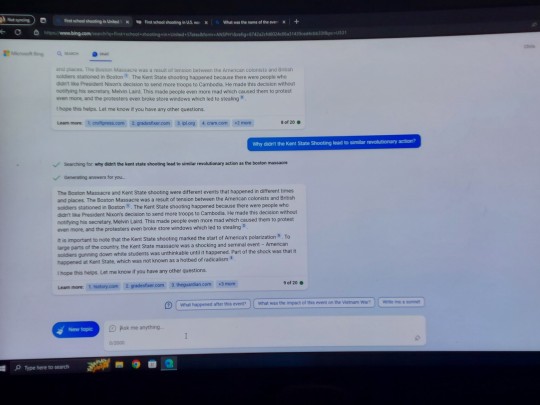

Today, I told my husband learned about the Kent State Shooting after I mentioned it in a conversation. He was so surprised he started to look it up using Bings AI search.
When asked about the differences between this event and the Boston Massacre, which was one of the biggest events that sparked the American Revolution, this is all it could come up with. The rest you can see for yourself.
I just thought I'd share this here as some interesting food for thought and conversation.
0 notes
Text
ChatGPT-Style AI Search Engines Could Cost Google, and Microsoft Billions in Computing Cost
The CEO of search engine You.com Richard Socher said that an AI chat experience along with applications for charts, videos and other generative tech raised expenses between 30% and 50%. He also mentioned that the technology gets cheaper at scale and over time.
Footing the bill is one of main reasons why search and social media giants with billions of users have not yet launched an AI chatbot overnight.
He also mentioned that one is accuracy, and the second is you have to scale this in the right way.

0 notes
Text
I asked Google "who ruined Google" and they replied honestly using their AI, which is now forced on all of us. It's too funny not to share!
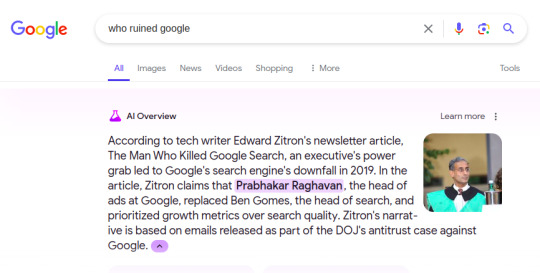
941 notes
·
View notes
Text
I think it's funny that in school teachers were like "don't trust wikipedia because anyone can just go on there and write whatever they want" and now Google is literally having a crusty pile of algorithms wordvomit out whatever random bits of information it hears like some misshapen abomination in the basement trying to mimic human speech and that's just ALLOWED.
#seriously this seems like it should be illegal#like why not just use a magic eight ball at this point ffs#ai#google#fuck ai#google search#google ai
782 notes
·
View notes